#see how they contrast with how they view themselves and how they react. what makes them waver. etc
Note
I would love to hear some insight on what your oc creation process looks like. They're so detailed. I love all of the ones I've read about so far and they're all so fleshed out! I just use the same three ocs and slightly change their backstory lmao. You're so good at coming up with the character designs, theyre all chefs kiss. 🤩🤌
Ten days later and I still don't have a response for you anon. After I got over the SHOCK of this wonderfully beautiful compliment, I have been fluctuated between being stuck at work and pondering an answer to this. And I don't think I have a good enough answer for you. Nothing wise or cohesive.
However, leaving that at that doesn't suffice. So, I'm going to try.
I think I've mentioned on here that in the past, I used to use things like zodiac, MBTI, and Enneagram as a baseline. Especially when I first started (actually when I first started, I created self-inserts and let them run wild but that was there early on), I would look at the traits of their Sun Sign (then I discovered moon and rising signs too and added those as well) then apply them to my OC. But it wasn't just from one website, I'd scourge different sites and read the summaries too. I started with the stereotypes and then began reading forums for the people who believed in zodiac but didn't fit fully what they were born under. I researched characters that were born under the sign as my own, and compared and contrasted. (I did the same when I was into MBTI and Enneagram, which allowed for more variation from the norm.)
I complied docs and lists. I took quizzes, etc. I was way too serious about it. But certainly opened me to a lot of adjectives for descriptors as well as the perspective of how people viewed themselves/viewed others, I think.
Another thing I did is I would take bits and pieces of my favorite (and not so favorite) characters and just .... cannabilize them. LOL. For a lack of better word. Make my Frankenstein. This tends to help me a lot when I struggle with 'voice'. Particularly if the character is one from a show or film or podcast. Because for me, at least, it helps me visualize cadence.
Once you have character traits, interests, etc knocked out, I also feel it's important to consider background and desire. Where are they from? Where is their family from? Where have they been? Where are they going? And, of course, what do they want? That last isn't always easy but even the most vague idea or simpliest of goals as well as themes can be helpful.
Kendis: To go to X-TOWN to find out what their brother is up to; to be independent, to become a doctor.
Mason: To head back home.
Andy: To protect and observe.
These are three (of a few) characters that I played in an RP. The details of the goal both specifically to them and the game helped in guiding which character I focused more on (lmao Kendis), but each character's desires gained them plot and gave me something something to fall back on when I felt stuck on what to do with them.
I'm sure there is more stuff but I'm tired. lol. The brain wanes.
I just wanted to say your characters are probably more fleshed out than you give yourself credit. Goodness knows I don't see my babies as "detailed" (so thanks again for continously making my day with that). But I think one of the best ways to make them grow - outside of tinkering on their personality - is to PUT THEM IN SITUATIONS! Whether it's in rp, an if, or headcanons. Challenge them -- see how they are when they're at ease, see how they when they're angry, see how the are when there are stakes, etc.
I bet you'll surprise yourself with what you come up with and what comes out on the other side! Hope this helps <3
#grapecase metas#grapecase answers#character building#anon#another thing outside of pondering your fave characters is ponder yourself and people you know#see how they contrast with how they view themselves and how they react. what makes them waver. etc#like dont freud your family up. just observe#also another thing i like to do is to push myself to try characters and traits outside of my comfort zone#tho i do fall back -- and i try to remind myself thats okay too#grapes chars#long post
7 notes
·
View notes
Text
++ 𝐀𝐑𝐋𝐄𝐂𝐂𝐇𝐈𝐍𝐎
[summary] you accompany arlecchino to a business meal.
[cws] reader wears a dress but is otherwise gn. murder. short.

Arlecchino has never brought you along on her business trips before, and would have preferred to keep it that way, but you had been insistent on coming along, lamenting that she left you by your lonesome for far too long whenever she left on business.
You had fussed and moped and she had been took it in stride, planning on returning with a few jewels to join your vast collection, along with a few other trinkets you seemed to collect for the fun of it, but then you had begun to ignore her.
Her greetings were met with silence, her kisses met with unresponsive lips or a turn of your head, and you chose to stay on your side of the bed at night opposed to burrowing into her side as you normally did.
It was one the cruelest forms of torture she had seen — the withholding of your affections.
She caved very quickly after that, allowing you to come along as long as you followed one simple rule.
Never venture away from her side.
Arlecchino was a woman with many enemies. Even if her position as a Harbinger didn’t automatically make her hated by many, her own ways in which she handled others would have surely done so. There had been few attempts on her life, most people having enough self preservation to steer clear of her, but some people had been foolishly spurred on by the promise of insurmountable amounts of moral.
Those people had quickly found themselves with their heads in their laps, the lucky ones, anyways…the unlucky ones had been turned over to Dottore so he could further his knowledge on all the different ways to make a human writhe in agony.
While she never fretted about who may be lurking around corners and waiting for their chance to strike her down (a chance that she would never give them), she did fret when you were brought into the equation.
An attempt on her life was an inconsequential thing in terms of your own, and she didn’t want to find out just how badly she’d react if you were ever hurt, or worse, killed.
“As much as I love sitting around and watching two old men whisper back and forth,” you lowly start, a bored expression on your face as you turn to face her, “I’d much rather be doing something else.” Arlecchino takes a sip of her drink, black fingers a stark contrast to the porcelain teacup in her hand. “How much longer do we have to sit through this before they inevitably do whatever it is you want them to?”
“About two more cups full of tea, and possibly a desert.” You deflate. “Need I remind you that you were the one insistent on coming along?” She inclines her head in your direction, giving only a slither of her attention to the two men sat across from the both of you. They’re Fontaine’s top researchers, secrets that are unknown to many locked away in their minds, secrets that Arlecchino plans on getting, one way or another.
“That’s because I thought we’d be doing something interesting.” You stress, hands fiddling with the sleeves of your dress, and she gives you a leisurely once over, humming to herself as she appreciates the view. “Tartaglia has told me all about the things you get up to when I’m not around, and I wanted to see it for my own eyes.” Ah, so that’s what had brought on the sudden insistence that you tag along.
“You really shouldn’t listen to all the things that boy tells you. It’s highly dramatized.” You purse your lips, and just as you go to say something you’re cut off, one of the researchers -Nil, she believes- finally stopping his discussion with his partner and giving Arlecchino his attention.
“We talked it over and while we did find the offer to be mutually beneficial… collaborating with the Fatui is something that we just cannot do!” Nil raises his voice, and Arlecchino is glad that she chose to rent out the entirety of Hotel Debord. “We won’t deny that you’ve done your fair share of good deeds for the people of Fontaine, particularly the children, but that doesn’t excuse all the murdering, torturing, and brutalizing you’ve done!”
You bristle beside her, and she takes another sip of her tea as thrust a finger in their direction. “Excuse you! I suggest you watch your tone when you speak to her, you old, senile coot.” The man beside Nil chooses to be offended next, and Arlecchino places her teacup down.
“How unfortunate that we couldn’t come to an agreement.” All parties ignore her, and she has half a mind to see how long the three of you could argue back and forth before growing tired, but then an insult is being thrown your way, and your brows are furrowing as your eyes grow glassy and…
“Nil!”
The fire starts from within, and Arlecchino clasps her hands together as blisters begin to form on Nil’s skin, the blood inside his veins boiling. He’s only able to moan in pain, hands fruitlessly clawing at his skin in an attempt to quell the flames.
“What did you do!?” His partner screeches before grabbing the pitcher of water in the center of the table and dousing Nil in it - a valiant effort it was, but ultimately pointless. “Nil—Gods, what did you do?”
A shaky breath comes from beside her, and Arlecchino turns to see you watching the sight in awe, your hands splayed on the table as you take it all in with unblinking eyes.
“He insulted my fiancé, so he paid the price.” Your eyes dart to hers, and a heat completely different from the one emanating from the charring corpse swirls in her gut. “And a fair price it was, don’t you agree?”
You blink as if coming out of a daze, and your head slowly swivels toward her. There’s a mix of emotions swirling in your eyes, but she’s studied you long enough to be able to pinpoint them all; horror, trepidation, awe, admiration, and the undying love that’s without a doubt reflected in her own gaze.
“Yes.”
It’s why the two of you fit together so effortlessly.
205 notes
·
View notes
Text
Today's chapter really is like... Excuse me she's literally dying over there can you two please have some decency and figure your shit out outside.
But jokes aside, we have here two motifs that keep repeating themselves, an echo of the Conventionist, of words and reactions spoken between life and death, and this theme of Divine authority versus mundane authority. Fantine is the conventionist and Valjean is the bishop come to bless her but being the one who is blessed
And since Javert instinctively obeys the highest authority in the room because he's literally a dog (and at this point they thought this was how dogs worked) he obeys Valjean's divine mandate. Tho also he had an iron bar with him, you get my point.
It's very interesting how Javert's loyalties change because he doesn't think for himself and only reacts to outside forces. This character is fascinating as like an idea. I've seen this idea play out in Stefan Zweig's The Royal Game but it isn't the only time I've seen it, it's also a repeated theme is the Star Trek original series, to name a couple examples.
It's also something that ties into orientalism (I've been reading Edward Said shh) and like this contrast of the learned enlightened Western man versus the base, thoughtless, purely instinctual and reactive Oriental. And the oriental of course is not a set thing but a vague definition that can change meanings depending on context. For Stefan Zweig this man is represented by an eastern european peasant contrasted to an intellectual austrian royalist. The entire novella is about the futile battle between the two extremes, the internal journey and the purely external. In Star Trek the contrast is between a being of pure unfeeling logic, a computer, and its inherent inferiority to a man according to Roddenberry's point of view. The computer always loses to the greatness of man's empathy and instinct. It's also like, wish fulfillment. To try to make yourself believe you can't be replaced by a computer.
Anyway this was a bit of a tangent because I have some thoughts about Star Trek's orientalism re: Spock. But also because Hugo looooooves an illuminism VS barbarism contrast and he loooooves orientalism. And I argue that Les Mis is actually a turning point for him. Because if you read Toilers of the Sea what you get is actually a kind of reversal or culmination of his ideas on the grotesque and the barbarian. Maybe because he left France and actually saw that there are other people in the world with different worldviews and he was able to grasp them because they were still European
edit: Edward Said talks a lot about Victor Hugo, Flaubert and Nerval in Orientalism btw and an attentive reader can very clearly see the aspects of orientalism that stil permeate Les Mis even when he isn't even talking about the orient itself. The orient presents itself as a dramatic trope or a creation of the ""West"" for their dramas... Good book btw
21 notes
·
View notes
Text
How would some characters from Hunter x Hunter react to a clingy and insecure s/o who has been left by their partner for someone else?
Tw: Yandere themes, unhealthy mindset, unhealthy relationship, possessive behavior, obsession, paranoia, clinginess, manipulation, gaslighting, delusion, isolation, stalking, torture, death
Clingy and insecure s/o who was left by their partner
Gon Freecss
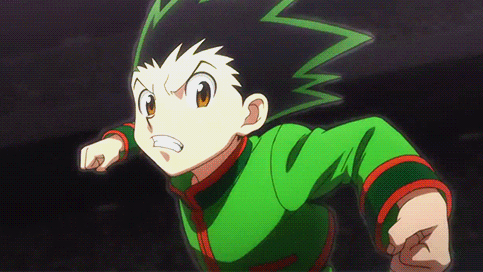
🎣Gon is a clingy boy himself so he is actually really happy to have a darling that is equally attached to him as he is to them. It only works in favor of his delusional mind. Why wouldn't he believe that you two are in a healthy relationship when you are so very glued to his side? It's incredibly sweet and only ends with him peppering his darling with kisses and hugs. The only downside is that he is pretty dense, he probably won't even notice for the longest time how deep your insecurities run and that there is a traumatic event behind your clinginess. Gon doesn't really see any need for you to be so shy and insecure, he views you as perfect and whilst he tries to cheer you up when you are sad, he doesn't see the bigger picture.
🎣Plainly confused when he hears what your problem is. Why would anyone leave an angel like you and cheat on you? It blows his mind though now at least he has an idea why you are rather quiet and insecure. It's obviously the fault of your partner, you did nothing wrong and he does feel encouraged that he is the better partner anyways. He can make you happy, Gon is sure about that. There is an increase in compliments and jokes he cracks to have you smile, he drags you out a lot more on dates outside to get you out of your shell. There is a chance that he happens to say something insensitive from time to time, still unable to understand why you would feel the way you feel because of the actions of an idiot. Regarding the idiot, Gon keeps that grin on his face but it just seems a little bit too bright, contrasting with the agitated aura surrounding him.
Killua Zoldyck
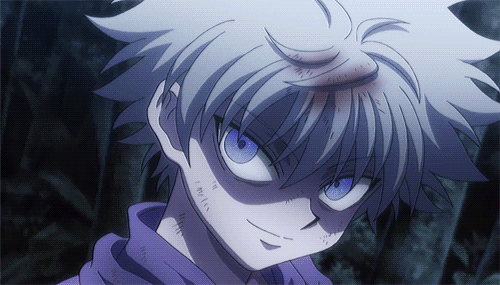
🪀Killua is touch-starved himself so he is glad that his darling is rather clingy themselves, though he won't make as big as a fuss about it. He tries to act cool yet it's obvious that he's a sucker for your clingy behavior. There is a mild fear that you might be intimidated by his status as an assassin so it's reassuring to know that you want him always near you. Yet Killua notices that you seem almost anxious when he has to leave, your attachment seems to be fueled by some sort of paranoia that he might leave you and your low self-esteem alarms him just as much. Despite noticing all of that, the white-haired male reaches a dead end, unsure how to approach that problem. How is he supposed to handle this?
🪀There is a dark glint in his eyes when he hears what has happened to you and there is this distinct feeling of guilt that he didn't know about it sooner. Your somewhat strange behavior suddenly makes sense and all of a sudden Killua glues himself to your side permanently. He won't leave you ever like that asshole did and in a way it's a thing of pride to prove to you right now that he's so much better. He won't say much but lets actions talk instead. Long cuddle sessions where he really only frees you from his grip when you have to go to the toilet, soothing back rubs and your favorite movies and video games where he either leans his head against your body or keeps you in his lap. Let's just pray that your partner is out of your life for good or Killua will guarantee that they pay for their sin of leaving you for someone else.
Kurapika Kurta

⛓️Kurapika is already overbearing and paranoid as it is under normal circumstances. So having his darling being so insecure, clingy and shy only worsens this condition since he seemingly goes crazy over them. He feels so much more protective and makes a huge fuss over his s/o, is barely able to leave them alone. He already suspects that there is a reason why you're so insecure and that thought agitates him already, gives him an uneasy feeling and he sort of pesters you to give him an answer. The Kurta doesn't really mind your dependence and clinginess that much since he can delude himself thanks to it but the idea of someone having hurt you and damaged you mentally infuriates him.
⛓️He doesn't say anything when you tell him but the change of eye color speaks volumes and you might have to hold him physically back from storming out the house. He's enraged with this scum of ex for leaving you and his heart partially breaks for you because they're to blame for your fear of not being enough. Kurapika is loyal beyond death so now that he knows that you fear that he might leave you as well has him growing more paranoid. He has sworn to be a lover who can protect you so he absolutely smothers you in his possessive love and affection afterwards, mutters that he'll never leave you and that you're perfect. It becomes physically painful to leave you alone since he knows that you're anxious. It's easy to talk himself into believing that keeping you locked away with only him being your social contact is the best for you and your partner is never heard of again.
Leorio Paradinight
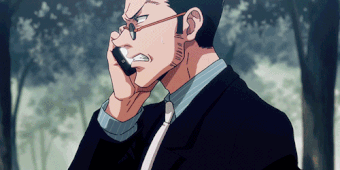
🧳He's quite dejected when he sees your constant state of insecurities, your fear of him leaving you and low self-esteem. As someone who wants to be a doctor I dare to say that he actually seems to realize that something is wrong. His whole mood basically is affected by you so he seems to be down more than just once a day himself yet pushes through it in an attempt to be there for you and help you. It's already painful enough for him to see you thinking so lowly of yourself, especially since he's a woshipper. On the other hand Leorio doesn't want to be too pushy and force you into telling him if it makes you uncomfortable, he ends up asking around though. He wants you to be happy, not anxious.
🧳Ready to throw hands once he knows who is to blame for your misery and his darling has to hold him back as well or else he'll search for that guy and deliever a good punch. Leorio is not even able to comprehend the thought of leaving you for someone else and now that he knows your condition, his heart breaks even more. Nevertheless he is beyond determined to give you the love he deserves and goes out of his way to make you happy. From praising and complimenting you, showering you in physical affection and taking you out on dates to buy you your favorite food and gift you flowers and plushies, he does everything. If he has to humiliate himself a bit to see you smiling and laughing so be it. He avoids your ex like the pest though and if he does see him, he turns into a banshee with the insults and maybe punches he throws their way.
Chrollo Lucilfer
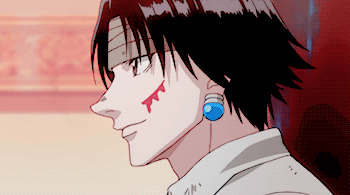
📖He reads his darling like a book so he absolutely notices their clingy and insecure behavior. Chrollo is without a doubt going to use that against his darling from a pretty early point on since he wants them to rely on him and love only him. It doesn't take a genius to realize that you've obviously made a bad experience regarding a relationship in the past and with the help of his members it is only a matter of short time before he knows what exactly happened to you. There is no interest to help you to establish your confidence once again, instead Chrollo will break his darling mentally down and plant the belief in their head that they only need him. It's fucking terrifying how easy this is for him with the situation at hand.
📖The leader is charismatic and charming throughout it all, lures his darling into a sense of security when with him. He adores the clinginess and will only worsen your fear to the point where you will end up begging him not to leave. He holds you close to him, lets you sit on his lap, reads books to you and will even let you wear his clothes if his scent helps you to calm down. It's no secret that he's greatly pleased with the way things evolve the way he wants them to do and your reliance on him has him going slightly reluctant to leave you at all even if he knows that you won't leave him. He coddles over his darling and the whole troupe ends up doting on you as well since you make their boss happy and they see you as part of their family. There is no denial that everyone is a bit overeager to take revenge on your ex and Chrollo will let them do so, torments them himself even.
Shalnark
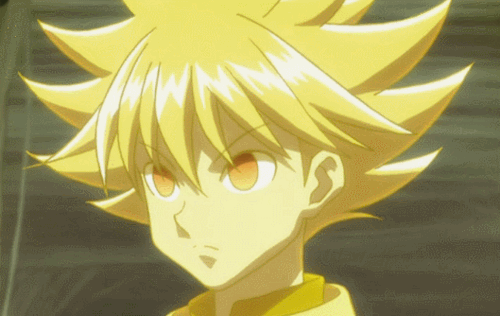
📱He probably knows from the get-go what has happened to his darling in their past and there is no denial that he will use darling's vulnerable state against them just as much as Chrollo. He does his online stalking well after all. The knowledge he collects online is effectively used when he starts pursuing you with that sweet smile of his. Your favorite movies and likes so he can lure you closer to him even if you shy away, afraid to be hurt again. Shalnark knows what he's doing though and his sweet and doting affection soon wins over your heart and you're left with clinging onto him out of fear to be left again. Something the blond loves, he sucks up all the attention and affection you give him out of fear to be abandoned again.
📱He only gaslights you and just like Chrollo has no intention to help you out of your hole. Instead he only digs deeper. The whole situation fuels his delusions that he is some knight in shining armor and needs to protect you. Who else will love you like he can after all? Certainly not the dickhead that left you and with frighting ease he breaks down your already damaged defenses. You only need and want him, everyone else is unnecessary. Shalnark at least makes it a point to fulfill the role of the lovely partner in between all his manipulation. He showers you with kisses and affection and brings you presents every once in a while. There is always this sickenly sweet grin on his face when he holds you and tells you that you only need him and no one else. Meanwhile your ex is experiencing the worst time of their life since Shalnark doesn't want nor need them in his plans. Just die.
Pakunoda
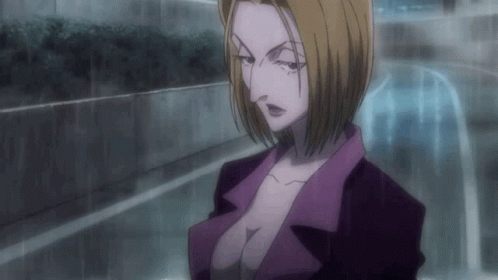
💘She has a fairly healthy relationship with her darling yet is perceptive and sharp. There is little to no time where she figures out that you suffer from a crippling fear that she might leave you and a case of low confidence and naturally assumes that you had a bad experience. Pakunoda won't use the situation against you though since she's a fairly harmless and caring Yandere and would rather help you getting over your anxiety and help you. She is patient and sweet, willing to stay with you longer if she can yet she is worried that you might grow too dependent on her. Pakunoda doesn't force you to tell her instantly though, even if she could use her Nen-ability. She wants you to tell her because you trust her.
💘Listens silently to you when you decide to tell her and supports and comforty you instantly after. She keeps her composure aside from the small scowl that shortly flashes her face when she hears about how your previous partner left you for someone else. Rather than manipulating you, her main goal is it to restore your confidence and if you fear that she might leave you, she's willing to sit down with you and tell you why she loves you. Even if it takes her over an hour, she will have that conversation if it helps you. Her focus lies less in your partner, as long as they stay out of your life she'll let them be. If they do seem to want to torture you a bit, she will have a serious talk with them, mixed with warnings to stay away from you. Otherwise she'll channel all her attention into being there for you and helping you to restore your confidence and happiness.
#yandere hunter x hunter#yandere hxh#yandere gon#yandere gon freecss#yandere killua#yandere killua zoldyck#yandere kurapika#yandere kurapika kurta#yandere leorio#yandere leorio paradinight#yandere chrollo#yandere chrollo lucilfer#yandere shalnark#yandere pakunoda
517 notes
·
View notes
Text
Xue Yang and the Privilege of Revenge - An Essay
How does Xue Yang’s act of personal revenge compare against the Jianghu’s wider view of revenge? When is violence of this kind deemed acceptable, and who benefits from this? I want to explore the themes within Mo Dao Zu Shi connecting classism and the privileges of revenge as explored through Xue Yang and his relationship with the Jin Clan.
Xue Yang’s major act of revenge is against the Chang Clan, the eradication of the entire family. His revenge is motivated by Chang Ci’an’s act of violence against him as a child. This act of violence involved the destruction of his hand and his childhood innocence, as far as the reader understands from the story he tells about himself.
Xue Yang actually considered this seriously. “Of course,” he replied, as if it was an odd question. “The finger was mine, but those lives belonged to others. No number of lives would’ve been enough. It was only fifty or so people—how could that be enough to pay for my finger?”
As an orphan on the streets, he was a member of society that is considered disposable, where finding justice for any crime would be near impossible when the perpetrator is higher up - worth more - in the eye of society than you. There is no over arcing justice system within the Clans, they police themselves.
In defiance of his low class position, Xue Yang places his life as more valuable than the Chang Clan and uses his act of violence to apply his personal world view on the material world. The initial act of violence taken against Xue Yang was intended to show the opposite; that his life is viewed as lacking to wider society. The fact that Chang Ci’an did not face any explicitly mentioned repercussions for this is proof that the Clans believe that Xue Yang is not someone of any importance to consider worrying about making amends with. Xue Yang’s act of revenge can be constructed as proving to them and the world that he does matter.
This dehumanisation he is treated with is repeated throughout Mo Dao Zu Shi. After working for the Jin, he is beaten and left for dead as his worth was only through his value to the Jin Clan’s research. There is no need to allow him to leave respectfully as the Jins correctly believe he would not be missed nor would anyone fight for Xue Yang’s justice in that situation. He is constantly compared to animals, and even his physical features are described as more animalistic than the other characters to emphasise his position within the narrative.
Instead, he grinned widely, baring his canine teeth in his direction.
Xue Yang reacts to this repeated mistreatment by turning it around. He looks down on the people around him, steals from them, threatens them, and turns them into fierce corpses. He takes any action to make them feel afraid or frustrated rather than superior to him. His revenge against the Chang fits into this model.
In the ‘Villainous Friends’ extra, his response of aggression is contrasted against Jin Guangyao’s response of civility. Jin Guangyao also came from a lower class background and was insulted for it. His response was to conform himself to appeal to their idealised worldview of a high class cultivator through obedience to his father and replication of their mannerisms. Xue Yang’s internal viewpoint contrasts this as he is not intending to change anyone’s mind, rather he asserts his own position that he matters through enacting violence. When the previous actions of Jin Guangyao come to light, his position within the eyes of the Jianghu shifts and they revert to seeing him as that lower class, dehumanised being, right alongside Xue Yang.
“Jin Guangyao later got rid of Xue Yang. What a perfect example of dog biting dog.”
Xue Yang’s continued comparisons with the Jin Clan illustrates the intersections of power and violence with Mo Dao Zu Shi. Xue Yang committed his first act of revenge against the Chang Clan when he was a guest cultivator working for the Jin. As we know, the Jins shielded him from the justice Xiao Xingchen wanted to have enacted because Xue Yang was helping them behind the scenes. There is irony in the fact that the Clan held most responsible for punishing Xue Yang’s act of revenge was the Jin Clan when compared against their own actions against the Wen Clan. The Jin Clan upheld the taking of the Wens clan land and the imprisonment of the remaining family members. The view of the cultivation world at that time was that the whole Clan should be held accountable, regardless of their own actions within the war.
Another guest cultivator stood up. “Of course it’s different. The Wen dogs committed all manner of evil deeds. They deserved to fall in such disgrace. All we’re doing is retaliating in kind, an eye for an eye. Giving them a taste of their own medicine. Where’s the fault in that?”
Revenge is thus seen by the Jianghu as a way of levelling the scales between two people and there is no fault in this. Xue Yang’s act falls in line with this way of thinking, and falls in line even more so with the Jin’s treatment of the Wens.
The morality of the Jianghu shows that revenge against an entire clan is justified, and that each and every family member can and should be held liable. The only ones who aren’t are those who surrendered to the Jin Clan, allying their power with theirs.
“Because the Wen dogs committed so many evil deeds, everyone with the surname of Wen can be killed without exception—do I understand you right? Many renegade clans from Qishan surrendered and joined the alliance, and they’ve since found support with the Jin Clan of Lanling. If I’m not mistaken, I see a few guests at this very banquet who used to be the family heads of clans affiliated with the Wen Clan.”
From this, the act of revenge also acts as a move to gain power, eradicating those who opposed or could future oppose the Jin sect. This Jin act in the same way that they protected Xue Yang, defending only those who benefit their interests. This also proves how shallow the ideologies of the Jianghu are. They will not stick to their prior beliefs if there is some way to benefit, or if the subject of their attention is of a lower class to them. The only ones who succeed and gain happiness in their own right are those that leave the Jianghu entirely, shown through Mianmian, Wei Wuxian and Lan Wangji at the end of the novel.
Through the comparisons drawn throughout the novel by Xue Yang’s close proximity to the Jin Clan, ideas of how and who is allowed to take revenge intersect with classism. Violence is used by those who have the privilege of power to defend themselves, and thus this violence becomes justified in the eyes of the people.
(Citations taken from Sevenseas edition of Grandmaster of Demonic Cultivation | Mo Dao Zu Shi)
27 notes
·
View notes
Text

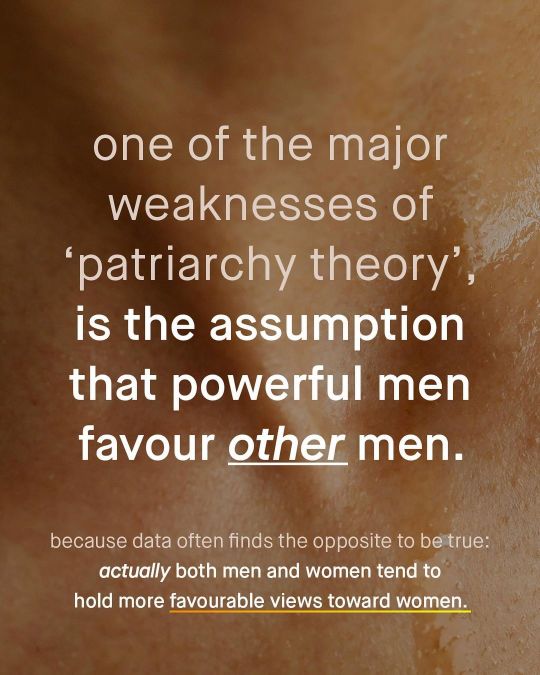
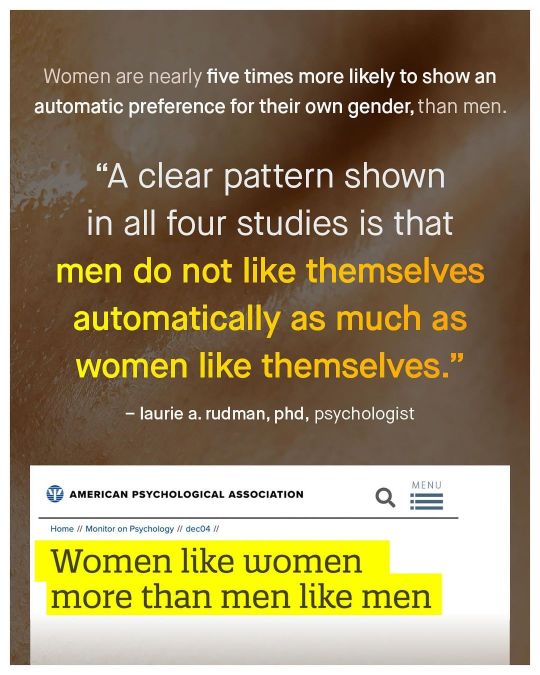

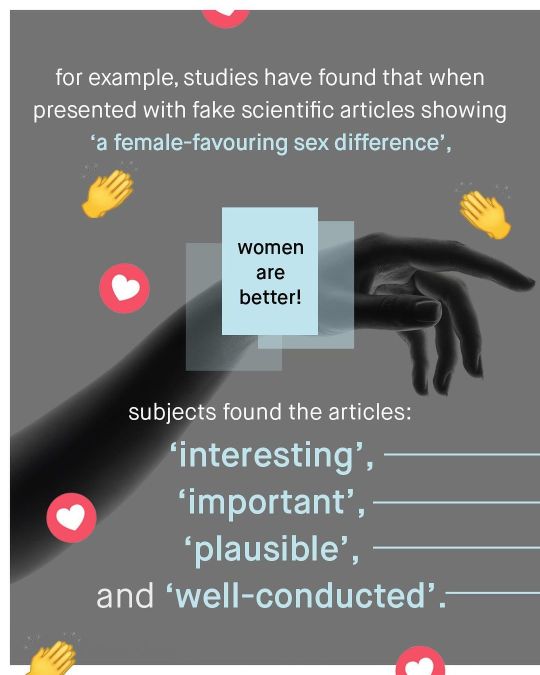
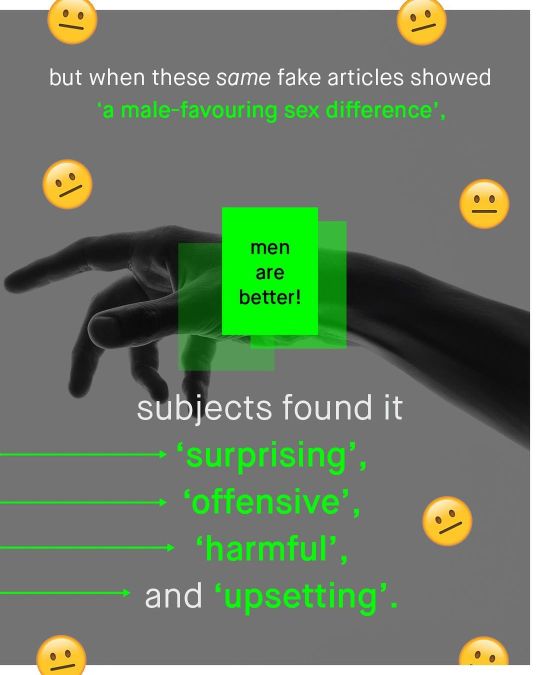




The political opinions of so many are predicated on the base level belief that ‘the world hates women’.
It is from this limited understanding, that our current conception of ‘structural sexism’ is born.
The belief that those in positions of power, who are men, are actively uplifting other men like them, whilst trampling upon women and girls.
And it makes sense at face value.
‘The Patriarchy’ is how many will describe this belief - the world dislikes women - and heaps an extra portion or two of privilege onto the plate of its favourite child: ‘man’.
The problem with this theory is that it often lies in stark contrast to what actual research tells us – the typical finding that both women and men actually hold more favourable views of women.
‘Women like women, more than men like men’ as the APA puts it (and nearly five times more at that).
But there is yet another hidden layer beneath this too… that men also like women, more than they like men.
And with that, ‘patriarchy theory’ takes a direct blow to the very core of its credibility.
Because actually, most people prefer women over men, rather than the other way around.
This phenomenon is well established and studied, and observed across generations, and in dozens of countries around the world.
It’s called the ‘Women Are Wonderful Effect’, and it describes how, in general, people associate more good things with women, and more bad things with men.
So is it time we question the notion of ‘a world that dislikes women’, and honestly asked ourselves, does the world like men any better?
What do you think?
-
Sources
Study one:
https://www.stevestewartwilliams.com/p/why-people-react-less-positively
Study two:
https://bpspsychub.onlinelibrary.wiley.com/doi/10.1111/bjop.12463
Study three:
https://www.apa.org/monitor/dec04/women
==
See also:
Abstract
Little is known about implicit evaluations of complex, multiply categorizable social targets. Across five studies (N = 5,204), we investigated implicit evaluations of targets varying in race, gender, social class, and age. Overall, the largest and most consistent evaluative bias was pro-women/anti-men bias, followed by smaller but nonetheless consistent pro-upper-class/anti-lower-class biases. By contrast, we observed less consistent effects of targets' race, no effects of targets' age, and no consistent interactions between target-level categories. An integrative data analysis highlighted a number of moderating factors, but a stable pro-women/anti-men and pro-upper-class/anti-lower-class bias across demographic groups. Overall, these results suggest that implicit biases compound across multiple categories asymmetrically, with a dominant category (here, gender) largely driving evaluations, and ancillary categories (here, social class and race) exerting relatively smaller additional effects. We discuss potential implications of this work for understanding how implicit biases operate in real-world social settings. (PsycInfo Database Record (c) 2022 APA, all rights reserved).
-
Xians reveal too much about themselves when they say that without their god's rules, there would be endless murdering, rape, theft, etc. It's what they would do.
"Patriarchy" theory proponents do the same thing. They assume that men are as biased towards men as they are to women. It's what they would do.
All it really does is confesses to us their own bias, and that their claims aren't based on evidence. Which we already know.
#The Tin Men#women are wonderful#women are wonderful effect#bias#implicit bias#patriarchy theory#patriarchy#religion is a mental illness
4 notes
·
View notes
Text
On sexuality assumptions in Sherlock (part 2)
So, I literally forgot this was supposed to be a two-parter and what I was even going to write about in part two, but then I remembered. This is about examining some TJLC/Johnlock evidence that is potentially actually problematic and regressive if taken as fact. Not all of them are ProblematicTM, some are just... weird. These are in no particular order and some are possible stretches, but hey, I am allowed to have meta fun too.
Number 1: Mycroft making the sarcastic comment about John and Sherlock's engagement is proof Sherlock is gay.
The reason why this feels regressive to me is because it implies that you can only make quips about your brother dating a man if your brother is gay. But... why? Why is it only acceptable to make this comment if the men in question date other men? It's not a joke about the concept of homosexuality itself.
The 'joke' is "You have been very close to my brother, moved in with him, and are spending a lot of time with him. What's next, marrying him?" That's the point of the comment. It has nothing to do with anyone being gay.
Mycroft doesn't mean they are actually a couple. I fully believe that if Sherlock had a female flatmate, he would have made the exact same comment. All this tells us is that Mycroft doesn't think being gay is a big deal or possibly that being gay in this world isn't that big of a deal.
First of all, let's entertain the possibility that Mycroft believes or knows that Sherlock is gay. If this implies that Sherlock is gay, isn't telling that to John, whom Mycroft just met, and can't be certain that they ever even discussed the topic, basically outing Sherlock to his flatmate?
Now I talked about the fact it's very possible Mycroft made this comment and the later one hinting about possible John/Sherlock sex in the future (which is much better evidence, but people focus much more on the first one since it's more apparent) is testing the waters to see how John feels about gay people and how he feels about being mistaken for a couple with another man or being accused of having feelings for a man.
If John reacted in a very defensive and/or homophobic manner, it's possible Mycroft would have made sure John stayed far away from his little brother. This in itself doesn't have to mean Mycroft believes Sherlock is gay, just that he is being cautious because bigots are unsafe to be around (let alone live with!) for anyone who isn't a bigot themselves.
Number 2: If Sherlock isn't gay, why doesn't he ever correct the people who think he is or that he's dating John?
Because he doesn't care what they think of him. Related to number 1. It's okay to wish people not to mislabel you. Not wanting people to think you're gay if you're not is not homophobia. But Sherlock just doesn't care. This is in contrast with John, who does correct people and doesn't want newspapers calling him a confirmed bachelor.
Number 3: Sherlock got a case wrong and accused a gay man of being a murderer because he was feeling bad about his Unrequited Gay Love for John, who was dating someone else at the time and he thought gay relationships were doomed to fail (this is about a case on John's blog)
This one is just... why. Sherlock is the Great Detective. He's the world's only consulting detective. Why would a man's sexuality influence his decision solely because he's hoping for a gay relationship for himself and is salty about it? Gay or not gay, there's no indication sexual orientation plays any factor in how he views or treats people. This assumption is just straight-up homophobic. I can't see it any other way. Sherlock thinking a man is a murderer because he's gay... is homophobic. Even if you believe Sherlock is gay, internalized homophobia is a thing. It would also make him look quite incompetent, unprofessional, and just straight-up Bad at his job, the one thing he is unquestionably Good at.
Now we get into the weaker ones, at least according to me.
Number 4: Sherlock knowing purple apart from lilac or making serviettes makes him Camp Gay.
I think this is just Sherlock being Sherlock. He knows the color because he knows and notices the things others don't while ignoring those he deems unimportant. As for the serviettes? Why? Because planning a wedding is a gay stereotype? Sherlock is most likely hyperfocused on the wedding because he's nervous about things changing.
Number 5: John was definitely about to make a Move on Sherlock during the stag night and that was the perfect time to do it
I sincerely hope this idea only extends to fiction (because I don't want to be one of these "if you support this in fiction you support it in real life too!!! people) but if it does not, hopefully none of these people ever become someone's Best Person at the wedding if they think seducing the groom right before a wedding is a good idea. Do they think John was about to make a move and if it didn't work just Mary marry anyway as a consolation prize? Do they think that's what happened in TSO3? We or John had no idea she was an assassin yet, so that would be really shitty.
Number 6: John lied about being bisexual
He didn't. The only way this would be true is if someone asked John if he's bisexual and he said no. Unless you think John being closeted and potentially hiding the truth about his sexuality and being purposefully vague about it is lying. It's not.
Number 7: Mycroft believed Sherlock was about to kiss John in front of Mary when asking for time alone
This one is just strange. A confession is one thing, especially if you are not directly confessing. But why would Sherlock do this? He was going to his death and had nothing to lose? Why would he do it in front of Mary? And Mycroft? And the other agents who I think were also still there? Why? Was he sure John would kiss him back? Did he even care?
Miscellaneous: John didn't want Sherlock looking at his laptop because he has a bunch of Gay Porn there
Or... because it's an invasion of privacy? This one isn't Problematic, it's just a stretch.
5 notes
·
View notes
Text
Each of the three new staff have made it a significant point in their narration to explain how they “see the Hotel differently” than the guests do. Differently than even the staff do, which brings on a whole host of very interesting implications.
I want to bring up the idea of contrasting ‘light’ and ‘dark,’ since that comes up a lot in relation to the Hotel herself. She is, herself, darkness. The natural state of the universe. Not quite nothingness, but the specific, cold, absence of life. The Hotel, from lobby to elevators to stairs and hallways to rooms, is death. Those inside the Hotel are lights, stars glimmering in Her vast darkness.
(On an unrelated note, it’s my personal view that when the Staff describe Madam Hotel as having eyes like starlight, it’s them catching glimpses of her full form. Condensed infinity of hotel.)
We know from the finale of Season 2 that the Hotel herself tried to “put out” those “three lights of [her] own making” and couldn’t do so without nearly unraveling herself. She also refers to the guests as lights, both in that episode and later on when we get narration from her, such as in 4.8:
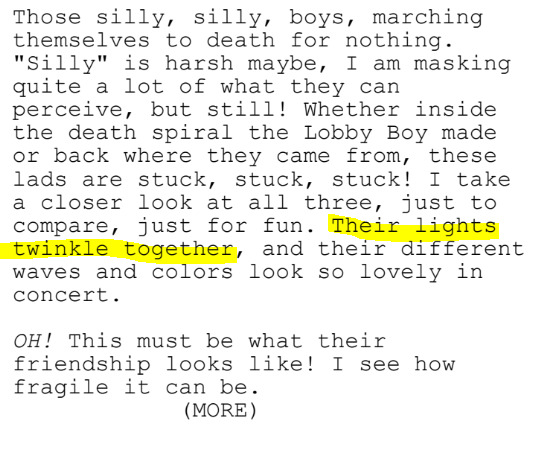

Now aside from me losing my mind now at how much you could parallel the three guests of that episode to the first three staff and not realizing this before...
We also know that the early staff don’t see the Hotel the same way the guests do. Often, they’ll comment on the guests seeing or reacting to things that aren’t within the staff’s perception. Things that can cause them to react and behave as if they were in a regular hotel up until the very end. The staff are aware that both their own, and the guests, perception can be shaped and warped by the Hotel’s whims. But still, the Hotel appears as a hotel to the first three staff.
The new gang has a decidedly different perspective. The Bellhop sees the Hotel as a massive amalgamation of meat and guts ( :-] ). The Concierge paints a picture of the Hotel’s structure as this....paper mache formality, as something that hides the true cosmic colors and shapes that underpin every part of the place. And the Auditor in the new ep introducing her refers constantly to darkness. The darkness from which they all come from, and which they will all return to.
The new staff are perceiving the Hotel as....herself, essentially.
That’s curious, because this set of staff is, at least as I understand it currently, fresh outta the oven. Created by Her as the result of the lead up and events of the Curtain arc.
This new set starts out with this...reverence towards the Hotel. This admiration and awe and wonder of Her. I wonder if this is because of their perception, or if it’s because they’re new.
There’s clear character development with our first set of staff, mostly because...Well, obviously. There’s no avoiding that. Admittedly, while I adore S1 very much, I don’t know how ‘canon’ their early characterization actually is since it seems to be around S2 that the series settles into itself.
But purely in-universe, I wonder if the reason the Hotel is bringing on these fresh employees now is because she’s noticed that the first three staff are becoming more human. More...like the guests. They first perceived themselves as part of a company structure (at least, the Owner did.) after all. Much less cosmic wonder, more powers that be in the sense of your vague, far away corporate overlord, y’know? And they grew to care for each other, to form bonds with one another despite starting out as infinite copies of a basic idea. Somehow, they found a way to persist. To become and individuate, not unlike the guests.
Buuuut, welllllll....What does that say, when the staff are just like the guests? How professional is that? We’ve got an operation to run here! And all this in-fighting and protectiveness and blah blah blah is getting. in. the. WAY! (Never mind that Madam Hotel was getting, in the way of them)
So, what to do? Can’t, er...fire them. Or rather, extinguish them. They may be more like the guests now, but they’re also her in a way. So integral that ridding herself of them would be unspooling herself. Her brute force punishments of S2 and the Curtain arc have only strengthened the old three’s resolve. The whole of S3 was both, I believe the staff’s origin and also end? and also another attempt from the Hotel Herself to get them to understand her. to understand their world. That worked....temporarily.
Maybe they need some encouragement! Some positive role models! Some good influences to rub off on them and get eeeeverybody on the right track again! And this time, let’s fix some of the old model’s problems while we’re at it. These three will get to see, from the start, what and how and why she is.
The only question remains, how will these new staff members change over time? What will happen if she loses control of them in the long run, too?
#the hotel podcast#also rereading the s2 finale transcript is. OOGH!#someone poke me to do a big hotel herself essay at some point#i could EASILY fill ten pages with my musings on her gkjshf#anyway to anyone who reads my long winded rambling abt this podcast:#genuinely thank u. means a lot#i hope i dont sound too insane lol#hotelpod analysis
25 notes
·
View notes
Text
Review: The Devil Judge (2021)

Region: South Korea
Aprox. Length: 19:52:50
Viewing Source: Viki
Summary: Set in a dystopian version of present-day Korea where daily life is chaos and society has collapsed to the point that people openly voice their distrust and hatred for their leaders. In this world bereft of law and order, Head Trial Judge Kang signals the need for change. His courtroom is the subject of a reality show where he mercilessly punishes the guilty, earning him the "Devil Judge" nickname. As a divisive figure with an aura of mystery that belies his true identity and ambitions, the public is unsure whether he is a true hero or someone, knowingly sowing the seeds of discontent in his courtroom.
A bitter rivalry has taken shape between the "Devil Judge" and the highly ambitious Jung Sun Ah, who has risen from poverty to become a corporate social responsibility foundation director. Into this turbulent world enter two childhood friends on a quest for true justice: rookie Judge Kim Ga On and Police Officer Yoon Soo Hyun. Do they have what it takes to challenge both the scheming Jung Sun Ah and the notorious "Devil Judge"?
Overall Opinion: I had just finished binging Beyond Evil and was foaming out the mouth for a show that would give me the same satisfaction when I stumbled upon The Devil Judge as a recommendation. While it wasn’t exactly the same tone I was looking for, the Devil Judge delivered on acting, plot, and cinematography and managed to meet my criteria.
The relationship developing between our main characters constantly keeps you on your toes. While sometimes it can feel like the story is dragging, there’s almost always something in a scene that will hold your attention. It’s really the characters that get you invested. Jinyoung and Ji Sung are fantastic working against one another and I was excited to see Park Gyu-young again after I really liked her in It’s Okay to Not Be Okay. Visually there’s so much to watch and a lot of attention is paid to incorporating story elements into the shots. The religious symbolism that’s woven into the visuals and composition serves to elevate the character dynamics and struggles and it’s the strength of these elements that really keep a viewer interested beyond just the storyline.
The only problem I had, outside where the pacing could drag, is a particular element used to get rid/win against the villains. It felt like the writers had written themselves into a corner with them and took an easy out. Now, that’s how I saw it, but I can recognize what the writers might have been attempting with this character's removal from the show.
Overall I highly recommend giving The Devil Judge a watch if you’re interested in character-driven shows with fantastic camera work and intense character dynamics.
Technical Rating: ★★★★★★★★★☆
Personal Rating: ★★★★★★★★☆☆
(See under the cut for a deeper analysis/opinions of character/plot/technical aspects. Beware of possible spoilers.)
Main Characters:
Kang Yo Han:
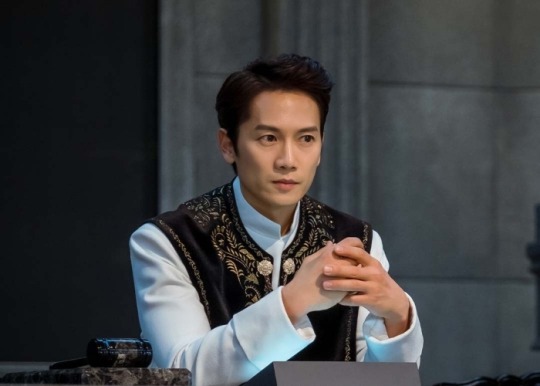
This is the first drama I’ve seen with Ji Sung and I was blown away by his ability to portray the layers of Yo-han’s character. Kang Yo-han is a conflicting and antagonistic hero, he’s morally grey, and throughout the story, you recognize and sympathize with the choices he’s making and the actions he’s willing to take. Some of my favorite scenes with Yo-han are when he’s reliving his trauma over Issac’s death and his rough upbringing. They are used to contrast Yo-han’s put-together facade. These moments are a window into his soul, into his turmoil, and each one is extremely well placed and well-acted. I particularly enjoy the ones that are back to back with Ga-on appearing because it’s another layer into Yo-han’s character, and how he reacts.
Yo-han is such an interesting character because he’s constantly challenging and pushing Ga-on, forcing him to question how he sees the world and what justice really means. Yo-han is also keeping the audience guessing about his own involvement in the events leading up to what’s taking place in the story. Ultimately he’s a tragic figure that has so much fire and rage inside himself it’s hard to look away when he’s holding himself back. Ji Sung plays the line so perfectly that even when Yo-han is smiling with false politeness, you can feel the rage that’s underneath it all, and getting to see it released is so satisfying.
Kim Ga On:

Ga-on is our point of view character (for the most part) and so, we experience the world through his moral compass and we follow as that compass is shattered by Kang Yo-han, time and time again. I love Ga-on and as this was my first time seeing Jinyoung in an acting role I was genuinely surprised by how much I enjoyed watching him embody this character. I think what I really enjoyed about Kim Ga-on is that he isn’t naive, he knows the injustices in the world, he understands that it’s not fair, but he fundamentally has hope that it can be changed, that it can be different, and through his interactions with Yo-han that outlook is shifted but never really twisted into something different. By the end of the show, Ga-on isn’t a jaded hero, he’s disillusioned but made stronger for it. He no longer passively believes that if he follows the rules the world and the villains of it will eventually fall in line, he becomes an active soldier in the fight to weed out the corruption in a system he remains hopeful he can affect.
The ending scene between him and Yo-han only highlights this fact as well. The older man returning, also a changed, to ensure sure that Ga-on doesn’t make the same choices as him, to keep his light alive.
I also love that Ga-on isn’t a character without flaws, he’s not some puppy-dog golden boy, even though he’s often viewed that way by the other characters, he fights, tooth and nail, and there’s violence to him that worries the people close to him. Ga-on is super interesting and feels just as complex as Yo-han, leading their scenes together to work almost perfectly within the story.
Jung Sun Ah:

As the leading female villain, I actually enjoyed Sun-ah even when I actively was calling for her blood. She’s got an air about her that almost makes me want to call her pathetic, but it’s too harsh of a word. She, at her core, is still a child. She’s greedy, wants things her way, is entitled, and believes because the world has done her wrong she can just take it in order to make it right. On the surface, Sun-ah is a mirror to Yo-han, but in reality, she isn’t and when she is faced with Yo-han’s secret involving the fire, that point is made clear to her and it’s so satisfying to see the reality of it sink in.
At times Sun-ah feels a bit too unhinged to me, but I think it adds to my interpretation of her even if I don’t always think it works. She’s a child playing dress-up, someone looking the part but not actually being it. It’s a fundamental idea of her character.
My biggest complaint with Sun-ah is that she kills herself. This is a personal issue as I felt like the writers using the same method twice within the show for two of their strong female antagonists came off as lazy and redundant. That being said, it does make sense for her to take the matter of her life into her own hands, she doesn’t want to give Yo-han the satisfaction of her death. I just wished it could have been written in a way where it didn’t have to feel so similar in action to Kyung-hee’s death.
Yoon Soo Hyun:

Full disclosure, I thought for sure the writers were going to kill Soo-hyun off far sooner than they did, but the second that Ga-on returned her affection (awkwardly as hell) I knew she was a goner, it was only a matter of time. Even with that being the case Soo-hyun manages to hold her own as a unique and strong character. She’s a badass but is able to maintain a certain softness, through the lens of being wholeheartedly in love with Ga-on, which doesn’t undermind her strength.
Soo-hyun plays a role within the story that keeps Ga-on standing while also being the opposite push for Yo-han’s influence and I think it places her in the position as being, funnily enough, a character with second-lead syndrome, even if she technically does get Ga-on. I think the kiss scene actually telegraphs it.
When Ga-on kisses her, Soo-hyun looks almost uncomfortable with it and not in a way that just seems like she wasn’t expecting it. I think, fundamentally, she didn’t want it or at least doesn't understand why it's happening. She even admits earlier, that she confesses her love to Ga-on just to stop him crying and while I firmly believe that Soo-hyun loves Ga-on, reading between the lines I do not think it’s romantic love and this is the moment she’s possibly realizing that.
Soo-hyun’s actions frustrated me at times, but it’s because as the viewer I knew things she didn’t but I always understood where she was coming from. I was sad about her death but it served the story and didn’t feel wasted, regardless of how obvious they’d made it that it was for sure going to happen.
Rating: ★★★★★
Side Characters:
Kang Elijah:

Most of the side characters in the show serve to cast Yo-han in conflicting light, amplifying the audience’s hesitation in believing him and trusting his intentions and Elijah is the most significant of them as she is the closest to Yo-han. Jeon Chae-eun’s portrayal of a teenager still unable to process the death of her parents, or reconcile the idea that her last connection to them, someone she’d loved so much, might have had a direct hand in their deaths is a visceral and strong performance. At almost all points she’s conflicted with her feelings towards Yo-han and it’s through Ga-on’s help as mediary that Elijah starts to lose those walls she’s built around a conviction that her parent’s death is her uncle's fault and when she realizes it’s happening she becomes even more unsure. Elijah, while only a side character, has so many layers working at the same time and she’s such an interesting character to throw into scenes because of the unique role she plays.
Oh Jin Joo:

I feel bad for Jin-joo as a character. She’s stuck in the middle of a situation and revenge plot she doesn’t even have a stake in, she’s a pawn in a much larger chess game, and eventually, she has to come to terms with that fact and it’s a bit heartbreaking. That aside, Jin-joo is able to hold her own and has a personality I think is interesting. She's smart, which is the best part of her character, she understands the roles she's being made to play, and while she's manipulated by Sun-ah and then it's all laid out for her, she uses this lapse in judgment to her advantage and the advantage of Yo-han and Ga-on. I think it could have been interesting if she was brought into the fold earlier, but I like that she remains a piece to the puzzle that you're not entirely sure where she'll be laid.
Cha Kyung Hee:
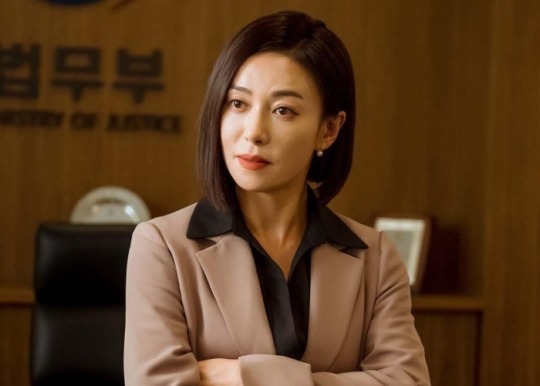
Kyung-hee is another one of those characters you love to hate and you're wondering when and if she'll crack under all the pressure that Yo-han mounts onto her. I actually enjoyed Kyung-hee's storyline a lot and how she has to move through it as a powerful woman desperately trying to maintain the power she's worked so hard for, even with the sacrifices she has to make. You're never rooting for her, she's inherently selfish, always thinking that even if she has to give something up she'll be able to get it back and then some if she can just get a leg over on one of the people trying to use her. The moment she procured the gun and didn't use it on Yo-han I knew she was going to end her own life. The entire episode is spent following her down spiral, her crumbling under the pressure of her poor and selfish choices and you just know that she's going to go out on her own terms.
Min Jung Ho:
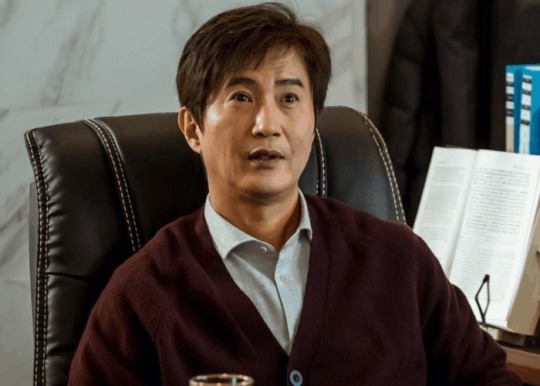
I saw Min Jung-ho and went "It's the guy from The Guest!" and then I immediately felt an air of distrust for this seemingly unassuming character settle in and was waiting for the reveal of his betrayal. The fact that they managed to keep it off until almost the last episode was fantastic, and they utilized him in perfect places to have me wondering if my knee-jerk reaction of labeling him as a mid to late-season twist was incorrect. You watch, however, as he becomes more and more insistent for Ga-on to keep his eyes on Yo-han, and that sense of "oh no..." comes right back. It's actually devastating, watching Ga-on finally put the pieces together that it wasn't Yo-han who was attempting to manipulate him, but his mentor, his father figure, who'd done it, and regardless of how Jung-ho denies it, had a direct hand in Soo-hyun's death. Jung-ho is a character who constantly tries to justify his actions, believing there is no way he can be in the wrong. He is who Ga-on might have been if he were more selfish, more unwilling to see the reality of the world they are living in.
Heo Jung Se:
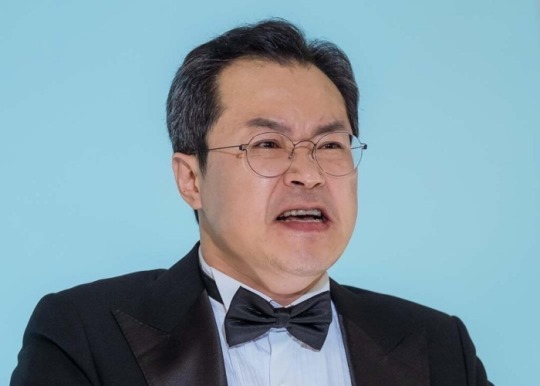
What a punchable character. He's the perfect puppet to Sun-ah's puppet-master, and it's through his ignorance and belief he's above her, that ultimately has him falling right into Yo-han's hands. It's always good to have a character that is uncomplicated and transparent, serving as the plot's distraction to pull focus away from the more underhanded workings. He's a highly immoral person and... given the political climate at the time, I can't help but think he's meant to draw the comparison to a certain orange government leader across the pond.
Rating: ★★★★☆
Story/Plot:
In terms of the overarching story with the overthrowing the government plot, it's fairly standard but it's when we get into the character's individual and intertwining stories, that's where the writing and the story shine. I appreciate that the character moments are intertwined with the driving plot and even when it looks like it's going to be an episode of the week kind of thing, like with the individual court cases, they also come back to Kang Yo-han's schemes and getting to see how they factor into it and sometimes, how they derail those plans is very satisfying.
Some of the slower moments in the story for me were when Ga-on and Soo-hyun were attempting to dig up more dirt on Yo-han and the brief side plot of Jung-ho getting hurt and attempting to convince Ga-on that Yo-han was to blame. Plot points like these have a repetitive feel and unfortunately, due to the nature of how Ga-on and Yo-han's relationship has to function, a lot of the filler/uncovering scenes are built to cast doubt on Yo-han. It's only frustrating because the audience at these points is sure that what he's doing is correct, even if we don't know where he's coming from.
Some of my favorite moments in the show are the more domesticated ones between the Kang's and Ga-on, they work to build the ebb and flow of the emotional highs and lows a show relies on for pacing and retaining audience investment. Just when you think everything is good, they're getting along, another wrench is thrown in the mix and it feels like Ga-on and Yo-han are back at square one. Because of the length of the show, it can feel like it drags but the acting and desire to see Yo-han get his revenge really helps to maintain enjoyment.
Rating: ★★★★☆
Technical/Visual Execution:
The Devil Judge is one of the most competently filmed Kdramas I've watched. Each scene feels so intentional in the way it's shot and composed, down to the set dressing and how a scene will start and finish. There was so much obvious attention to detail and I love finding the little hidden intentions in each episode. Some of the best scenes are when Yo-han and Ga-on are fighting, there's always a slow-mo or speed-up shot, the lighting is fantastic and you can feel the tension from how the camera moves or how it's cut. Another scene I loved just from how it looks is Yo-han's nightmare scene when he wakes up to Knag Issac, backlit by the church fire, standing in his bedroom, it's visually stunning and the juxtaposition when Ga-on comes to check on him is amazing.
Any complaints I might have are, outside of the highly thought-through scenes, the emotional moments, or the action, the show can slip into standard filmmaking. It's picking at threads but I would have been interested to see if they could have maintained an overall style or color throughout. The confrontations between Ga-on and Yo-han, scenes with Soo-hyun and Ga-on, and of course, the live court shows all feel like they have a unique visual aesthetic and if they'd been able to bring that into the moments between it could have been really cool.
Rating: ★★★★☆
Masterlist Nav · INBOX · Weekly Posting Schedule
Thank you for reading
#the devil judge#tdj#kim gaon#kang yohan#the devil judge 2021#kdrama review#kdrama#film-in-my-soul review
14 notes
·
View notes
Text
wanna ramble about how prom reacts to things for a sec hold on. <33
SO. OK. i have to talk about gladio first. gladio handles situations in a very, like… stereotypically masculine way? if that makes sense? he tackles things physically. if something is making him struggle mentally he Does something about it (doubt about his capability = taking on the tempering grounds. revealing essentially nothing about it to the party afterwards because the problem is solved and over with). he’s considerate of the others, of course, he loves them and they love him, but he also partially extends the expectation of this way of thinking to them (particularly noct).
noct, when faced with struggle, shuts Down. he doesn’t know how to express his feelings so he doesn’t, and it can leave him in a place where he’s… frozen? anger motivates him into action but sadness and grief do not. he gets lost in a way where gladio, in his place, would find or forge a path through foggy or not. this easily leads to conflict between the two that the story explores on multiple occasions!
MEANWHILE, prom. prom’s spent most of his life shaping himself into what others need of him or want him to be. doing this, naturally, means that he has to be aware of what others need/want of him. SO, this leads him into being a very emotionally intelligent person when it comes to other people. he’s very observant of others. this (aaand obviously him being noct’s best friend) means that he understands noct in a way the others don’t really (though they get other parts of him more, being his trainers/advisors they’re extra familiar with his flaws, what motivates him, you get the idea!!). prom knows how noct reacts to things, he knows when he needs distractions and when he needs support. so during the whole noct/gladio conflict following altissia, he stays silent about it! tries to break things up, lighten the mood, avoid the problem at its source. (“took more photos today. you… wanna see?”, etc etc.) it’s an obvious and interesting contrast to how gladio acts…
…buuuut also similar to how iggy does, in a way. iggy’s been around noct literally forever, and while more for reasons of role than personal ones like prom, he’s also observant. incredibly so. he just addresses things on a logical level instead of an emotional one. so he leaves things be if they look like they’ll work themselves out, and steps in if the situation calls for it (fodina caestino). noct and prom are very emotion-driven, gladio focuses on what needs to be done, and iggy always views things from the bigger picture (with exceptions in which he instinctually prioritizes duty no matter the cost.. ring of the lucii…)
I…. DIDN’T HAVE A SPECIFIC POINT TO MAKE I JUST LIKE TALKING ABOUT THEM BUT *gestures* boys!!!!! the end!!!!!
#lem text#lem ramblings#📸 gold and bones <3#🌗#🖼#IM SPOSED TO BE TRYING TO SLEEP BUT WELL. <3#prom’s conflict avoidance is present through the whole game really.. his priority is keeping morale up.!!#i just wrote 6 more tags about his instinct to lighten things NOPE NIGHTTIME LEMMY. LATER <3
5 notes
·
View notes
Text
Movie Review | Star Trek: The Motion Picture (Wise, 1979)
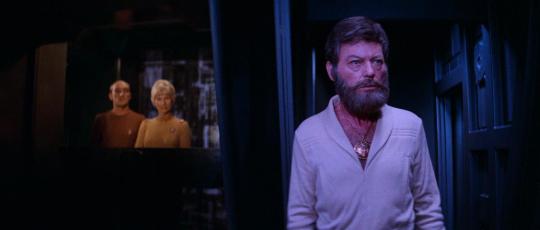
As a new big budget science fiction special effects extravaganza featuring pointy-eared aliens has just hit theatres and people are going in droves to see it, I decided to follow suit. That's right, the TIFF Bell Lightbox was playing a 4K restoration of the Director's Cut of Star Trek: The Motion Picture. Now, I'm not the biggest Star Trek fan, in that I've only sporadically seen episodes of different series over the years, and hadn't seen any of the TOS movies since high school. My opinion coincided with the general consensus that the even-numbered movies were better than the odd-numbered ones, and that the first one, while not all that bad, was maybe a little boring. Of course, I saw those all in pan-and-scan versions on network TV, and I think this movie plays quite a bit better theatrically.
Like I noted in my review of Avatar, I appreciate when a movie actually tries to sell you on its special effects and uses them in the service of grandiose visuals. This provides frequent admiring views of interstellar vistas, of the retro space age design of the Enterprise, and the eerie, psychedelic lightshow effects evoking space travel and the mysterious V'Ger. The latter especially is a triumph in design, coldly atmospheric and possessing a certain logic in design but one which eludes our meager human brains, not unlike its origin and its motivations as they're eventually revealed. I understand the Director's Cut was released in 2001 with CGI effects added to supplement the previously unfinished footage incorporated into the movie. Under the scrutiny of the restored, higher definition transfer, they hold up less flatteringly than the original effects work, but not so much as to be distracting. Jerry Goldsmith's score also goes a long way in giving grandeur to the images, from the rousing fanfare of the main theme, which had me wanting to pump my fist, to the Klingon battle music, which has more than a few hints of Sergei Prokofiev's score for Alexander Nevsky. If you're going to steal, steal from the best.
The movie feels very much like a reaction to Star Wars, in that it obviously was easier to make after the other movie made big budget effects-heavy science fiction movies a more commercially viable proposition, but also that it provides an alternative to the action-adventure mode of Star Wars and many science fiction blockbusters since. The dramatic thrust of the movie is provided by the characters trying to understand what V'Ger is and wants and how best to react. The use of force is just one option that's on the table, and one which they seek to avoid. I don't have any particular interest in the heart of the franchise or what have you (like I said, my experience is fairly limited), but the intellectual tack this takes is in sharp contrast to the more action-heavy thrills offered by the recent reboots. Like I alluded to above, this movie's approach allows for plenty of spectacle, and while I'd like to think there's room for both sensibilities, it is unfortunate that this one feels increasingly unviable.
Of course, I do think the movie suffers in how it handles this dynamic. The discussions themselves of how to tackle the situation I found engaging enough, and even the scenes of William Shatner hamming it up and giving hokey speeches where he spells out the movie's ideas I found moving in their earnestness. But much of the appeal of movie adaptations of beloved series is seeing them get the gang back together again, and while there's some delight in the return of Spock and gruff hippie new age hairy-chested McCoy, the movie sidelines the majority of the original cast members. Instead, we get scene after scene where Kirk arguing with a new character played by Stephen Collins, who does not give a bad performance technically, but plays a punk ass bitch who I wanted off the screen for reasons obvious within the movie and outside as well. I do not know the exact changes made between the Theatrical Cut and the Director's Cut, but one hopes for a new version where Collins is ejected through the airlock early in the movie and his arguments are given to Scotty, Uhura, Tsulu and Chekov, who have basically fuck all to do. There's also a new character played by Persis Khambatta who gets possessed by V'Ger to act as a probe (not that kind, this is a family friendly film), a turn of events that might have resonated more had it been one of the original characters. (I was gonna comment that her bald wig held up seamlessly under the restoration, but it turns out she shaved her head for real.) But I suppose as the first movie in the run, it was less inclined to take risks in this respect.
Anyway, good movie. Lousy CGI effects. Needed less Stephen Collins.
2 notes
·
View notes
Text
Writing Tips : Conflicting Nations
Getting to replay Fire Emblem Fates inspired me to write this post, simply because of how well written most of it's story is. Fire Emblem Three Houses later borrows a lot from Fates and unfolds it even further.
So how DOES one write about conflicting nations? How does one make it seem real? How does one intrigue readers? How does a Protagonist or other characters in that sort of fictional world react? What is their role? WELL! I say. Allow me to at least sprinkle some ideas on this topic.
There's multiple steps to this, and usually its important to have a rough idea and inspiration of what you want before you start world building and figuring out details. But once you're ready, I would suggest starting with the conflicting nations themselves.
Why are those nations at conflict, what are their motivations and what are their roles in this story?
Analysing history is important here. Usually all parties involved in such conflict have a role. One side is often an aggressor, the other the victim or defender. Which can create a Monochrome feel for the readers and make it usually easy to discern good from bad. It creates contrast. Good examples are the Fire Nation from Avatar being the obvious aggressor, or the Empire from Star wars.
But there's more options to play with here. There's also cases where all sides are aggressors, or all are defenders. Sometimes its even a mix. So this is where a motivation comes into play. Why does a nation begin a conflict with another? Is it for resources and wealth, or is it for size of land? Is it as simple as hatred and pettiness and pointless bloodshed? Or perhaps its not as greedy but a nation is forced to be offensive for their own survival. Are they lacking basic living resources like food and water or medicine, and thus need to plunder?
Once we've figured out a motivation and the sort of role a nation would be placed into, it becomes time to figure out their strategy. How do they approach this conflict? There's always politics involved with what happens, and while you don't need to figure out a whole party system, its at least good to figure out roughly what the people within your story get to know.
Nations can be entirely honest with their people, or they can lie. Are they telling the truth, that the enemy is the aggressor? Or are they using propaganda to cover up their own aggression? Are they actively recruiting new people, or are they trying to involve the public as little as possible? Perhaps the public doesn't even know of this conflict?
As soon as you have an idea of how you want to handle their conflicts, you can begin to place in your Protagonist and other characters and try to think of how they would react. Perhaps the Protag is gullible to the propaganda and wants to join the efforts. They might enter with a naïve point of view, allowing your as the writer to slowly damage their innocent views and show them the cruelties of the conflict, perhaps even make them start to see that its façade? Or is the Protag the sceptical type, someone who can see through the propaganda. Or perhaps they're on the edge of both.
Now knowing their point of view, you can begin to debate their motivations too. If they're the ignorant type, do they want to join the effort to do their part? Or do they just want to make money? Or do they enjoy conflict even? Or if they're the sceptical type, do they help the enemy? Or do they act passively? And if so, how long can they be passive before the conflict becomes their issue too?
Knowing their motivations, it's important to think of a turning or break point. How do you throw their points of view on the head? Does the ignorant one get scared by the reality of conflict? Do they lose a loved one? Do they get hurt themselves? Perhaps they received a vital piece of information by accident. Really think hard about how you can make your Protag interact with the idea of having been wrong about their previous ideas and assumptions. It creates tension and allows readers to begin thinking what they would do in the protag's shoes. Allow them to sympathise or in reverse really hate the protag. Both are viable choices.
This was all you really needed. Now its up to you to figure out how the conflict continues over time, and how it all ends. It is even worth considering whether the story should have a happy ending or a sad ending. Often, when conflict is involved, someone is either a hero, or they're dead. So which one is your roster of characters going to end up being? And how do the nations evolve afterwards? Who wins? What happens to the loser and what happens to the winner?
There's many case specific questions you must ask yourself when beginning to think up a story involving conflicting nations, as it requires a good know how of history and psychology.
For now I hope this can help at least some of you. I can really only recommend playing Fire Emblem Fates, Echoes and Three Houses for their beautiful storytelling with conflicting nations. Even Gundam series are a great watch as they are known to get serious and dark with their stories.
Have fun writing, have a good time and thanks for reading!
-Basil
2 notes
·
View notes
Text
Journal Entry | 2024
Theology
Taking a public stance on matters of spirit and faith is generally considered a bad PR move unless one is looking to make that stance their whole _thing_.
But I think my stance may endear me to both camps, even if I estrange some of the zealots in each.
I believe in God in the same way I believe in Microsoft Word.
When one describes the **spirit** of a thing, whether that's a rock, a tree, or a community, they're describing something about how it operates, about how it reacts, and how it navigates itself in various situations.
Looking at "spirits" as synonyms of "software" may seem very new and modern, but it is more traditional that one might first expect. The idea of a "daimon" in ancient Greece was that of a guiding spirit, an essence of a thing. Nature has daimons, cities have daimons, each person has their own personal daimon that might be thought of as a soul, personality, or social role. There's a material thing, and then there are the operating instructions that determine how it behaves.
Microsoft Word isn't just software, it's a specific software with specific owners and specific versions, only the latest of which is official canon, but many of which are still out there in the world, running on hardware, being used to accomplish all manner of tasks for better or for ill. Microsoft Word is what philosopher Daniel Dennett might call a "domesticated meme", and the same might be said for any strictly curated canon of ideas (such as Saint Michael, for example.)
Contrasted to domesticated, highly curated software that is managed by a regulatory body, there is the greater ecology of wild ideas in which these structures are embedded like gems in gold, their strict crystalline structures contrasting the curves of (relatively) soft gold.
In the software example, these might be all the wild code, all the viruses that exist because... well... they simply exist because they can reproduce and make themselves exist whether or not we want them to.
This distinction between wild and tame spirits might be most clearly articulated in the categories of "kami" and "yokai" in Shinto, which is a religion which has emerged from a synthesis of endemic Japanese spiritual practices and their reaction to Chinese influences, especially Buddhism.
I have come to have this view, of seeing spiritual and religious ideas as attempts to describe or influence the software that runs on human software, not out of some ideal or because I think that's how it _should_ be, but because I find this view helps me to be able to maintain literacy and fluency in two different conceptual dialects without having to choose sides.
When discussing matters philosophical, it's often good etiquette and genuinely helpful to try debate, to fight, to look for holes and exceptions in the academic tradition. In this way the scientific method has evolved, a process of systematically attacking one's own ideas and changing one's mind when proven wrong. But what is good manners in one culture is often the upmost rudeness in another. In both the realm of spirituality, the divine law of improv theater holds, that of "yes and".
I can tell someone their god isn't _this_, or that stars don't _that_, but I can also go to see a film and shout to the audience that that's not Frodo Baggins, that's Elijah Wood! This may sound like I'm dismissing the genuinely held beliefs of others as mere fiction, and in a way I am, but before passing judgement on me I ask that you hear me out on what else I so dismiss: Mathematics, I believe, is a useful story we tell ourselves; a language we invent rather that an objective absolute to discover. More importantly, I could degrade myself as merely a bag of bone and guts, a series of chemical reactions that's having a hallucination about being a person... but fuck that. I like the story, the fiction, that people are persons and have dignity and rights. If someone tries to take away my story of personhood they have declared enmity upon me. If I'm allowed to identify with a violent fierceness to the hardware that runs my software, then who am I to deny others that same madness?
Similarly, if I don't like something in Microsoft Word I generally don't go into the base code and make my own edits, and insist others have to modify their own copies of the program in the same way I did. I accept that this is the current version of the software and may point out some bugs for later patching, but Microsoft is in charge of that decision.
I could delve deeper into several related rants about non-dualism, about recursion, but that's for another time.
Looking at things this way has helped me stay true to my own experience while also respecting the experience of others.
I will not tell you, whoever you are, that this is how you must see things, and I would rather not say it's even true. What I will tell you is that at least one person has found a lot of usefulness and beauty in being able to see both sides along this particular divide, and I feel that if I closed one eye or the other I would miss out on so much of the astonishing artistry of this queer and contradictory world. I like the view from here, and if you like it too, all the better.
Dakota Schuck
Journal Entry | 2024
0 notes
Text
Dante Calabrese (What Remains?) "The Hidden message with Reflection of Horror and Societal Judgement" (Final Essay)
Dante Calabrese
A number of themes and messages have been attempted to be conveyed to audiences via films over the history of the medium. I want to discuss the horror film genre in this article, specifically discussing Frankenstein (1931). & the same concept used in the 1935 film The Bride of Frankenstein, as well as how society conventions are mirrored. There were some major concerns at the time this movie was filmed. I'll talk about a few things in this movie and how the monster is basically just a real-life human being, most of all the most impactful connection and understanding of implementing a hidden message with a reflection with societal judgement would be seen in "I Walked With A Zombie".
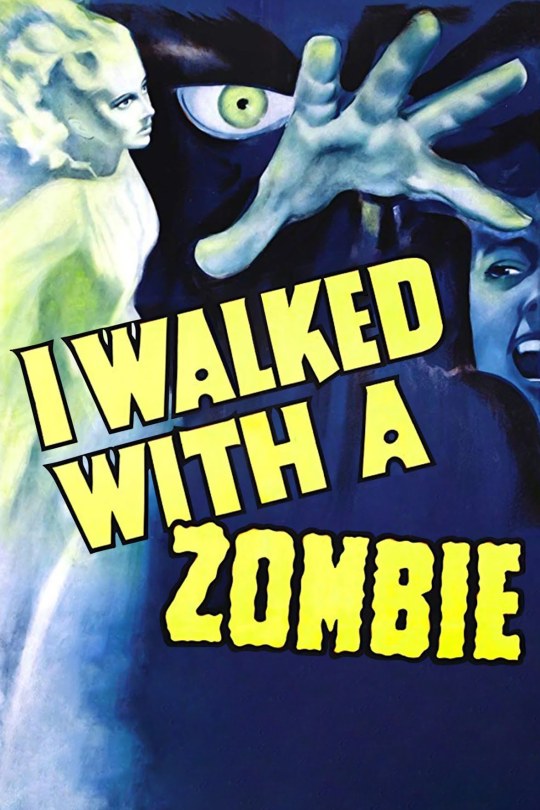
Without a doubt horror genres have influenced every aspect of hollywood film making from the very beginning till in todays era of films for 2023, It made the effort of utilizing a sense of fear mixed with the harsh reality of implementing meaningful unique perspectives alike and so on etc. Giving the viewers a sense of fear of not liking what they see of others people appearances or how they represent themselves or lash out the way they do cause of this. Society and human beings throughout history and in the film of horror always are seen reacting the way they do due to the deeper root of fear and not understanding or seen as adnomal in societys standards causing them to shun or verbally attack one another.
Back during 1943 saw the creation of the movie “I Walked With A Zombies”, which was made by RKO Pictures. I admit that I had never actually heard of or watched any movies from RKO Studios, but I picked this film because I was curious to see how the tone and decisions would stack up against those made by the other, more well-known studios. This movie differed from other horror movies I’ve seen in the past, and I believe there are some significant stylistic contrasts between it and the horror movies from the 1930s I watched last week. Regarding the idea of last weeks film for summary i watched “Frankenstien” & ‘The Bride of Frankenstien".The idea of Frankenstein serving as a vehicle for early Hollywood franchises makes much more sense after viewing both James Whale films from the 1930s than it did with “just” the 1931 original. The majority of Frankenstein is made up of exaggerated sequences that have been warped from their original, more subdued counterparts in the novel, giving the Monster on screen a world that feels more forceful, antagonistic, and theatrical. I believe that this movie makes an effort to deal with more serious issues, which I feel is unusual for a horror movie because I believe that most horror movies focus more on creating an emotional response than on trying to convey a larger message. Ironically it shows the influence of how society creates ideas and concept being influenced by the real world around us even in todays hollywood movies standards, what makes this very special is knowing the context of what was going on in the world of 1943 at the time with society dealing with racism and utilizing the deeper context of an influential narritive while giving the audience a mindful and crucial understanding at the time with racism. A few key point examples that solitify this and give weight for having this strong connection would be in these specific scenes, The medium shot shows Frankenstein and his helper, along with their conversational expressions and gestures. Later in the film displaying the manner the sequence with the father carrying his deceased daughter was filmed allowed for the villagers' reactions to be captured one by one instead of all at once. The peasants' facial emotions are captured by the camera panning sideways and backward. Additionally, there is deep focus and precise framing that enable viewers to continuously see how the villagers react to what they are viewing.The scene during the film showing the monster "Frankenstien Befriending Maria the little girl at the lake sharing a symbolic and emotional connectionm showing how the real monsters are humans rather than Frankenstien. & Lastly the misinterpretation and status as an outsider, the movie's monster Adam came to represent American individualism in a way. This served as inspiration for numerous Universal Pictures productions in which a misunderstood monster faces social injustice, attracting top talent for related films in the future. For the Film The Bride of Frankenstein expanded on this theme of oppression and repression by including a female character, since women are fundamentally marginalized and sexualized in our culture. As a result, the Bride became the "Other," a horror movie cliché known as the "Return of the Repressed and the Other." Despite having little on screen time, the Bride's presence and rejection of Adam demonstrated the challenges faced by women and the standards of beauty.

Elizabeth Young also uses Bride of Frankenstein as a way of analyzing social attitudes to race and gender in 1930s America in her essay ‘Here Comes the Bride: Wedding, Gender and Race in Bride of Frankenstein’, a text I shall be returning to later as it offers cogent arguments in the way systems of repression are encoded, subverted and reinforced in Whale’s films” (Smith, 22).
"The social context of Whale’s Frankenstein films, and of the Universal production output during the 1930s in general, cannot be underestimated. David J. Skal writes that Frankenstein’s monster was ‘like a battered hood ornament for a wrecked economy’ (Skal, 1992: 132).”
Frankenstein's overarching message heavily relies on the notion of a monster being misinterpreted and being an outcast in a society of others who all have certain similarities. "Whale's Frankenstein films share little in common with Shelley's novel, apart from the most basic plot lines and concepts of Faustian progeny; instead, Whale’s vision of the monster as a deeply tormented and sympathetic antagonist offers a trenchant social commentary on the role of the outsider in a foreign culture," is one quote I came across in "So Why Shouldn’t I Write of Monsters?: Defining Monstrosity in Universal’s Horror Films." This quotation aids in elaborating on the concept of social outcasts as well as the feelings and occurrences.
Smith, Andy W. “‘So Why Shouldn’t I Write of Monsters?’: Defining Monstrosity in Universal’s Horror Films.” Gothic Film: An Edinburgh Companion, edited by Richard J. Hand and Jay McRoy, Edinburgh University Press, 2020, pp. 21–36. JSTOR, http://www.jstor.org/stable/10.3366/j.ctv10kmdxf.7. Accessed 1 Dec. 2023.
Its very unique and impactful emotionally at times when watching this film there are no doubt future generational films even in todays society of the industry in the world that takes a genre and telling an important serious real world message and problems that still arise today even now. One example i can think of another horror film that utilizes the idea of racism while making a great horror film is “Get Out”, which sees a similar concept of racism but instead of being zombies its dealing with the idea of an interacial couple as well of twisting the concept with the director jordan peel showing and giving the audiance a taste in the horror format of seeing what racially motivated anxiety of being a black person feels like. Going back to the “I Walked with a Zombie”. I believe the decision was taken to address these issues because of the time period and what was going on when this movie was published. In this movie, larger-than-life concepts like slavery and ideals of racism are depicted. Back during In the 1930s and 1940s, there was a lot of racism, especially in the south, but there were racist acts all across the nation.The decision to address this topic and highlight how it was a problem in the country was a strong one made in the film, and I also feel that it was distinctive given the visual style of the picture. I think that what sets I walked with a zombie apart from other horror movies is that broader themes and tackling topics are not generally associated with horror movies. Whats worse in the end of all this we still see racism alive and breathing today, as well of other film genres and formats tackling the issue without shoving it in the audiances face at time while telling an impactful story and entertaining the audience and industy films of hollywood. I really feel that the film being in black and white gave an extra layer of emmersion when telling this story rather than in color. It shows how films such as “I Walked with a Zombie” as well Jordan Peels “Get Out”, takes a scary and real life world issue but instead tackling it in the form of art and story telling visually. I feel its very hard to have a film such as this if it was released in todays time and climate were in it wouldnt be recieved very well what so ever. Lastly i really feel and liked the name of the Studio RKO’s as well just there catalog of films they developed which i feel are unique and gives them a specific identity and face that only people would recognize them for as a studios in the end.
“The next step could be for this kind of filmmaking to be seen as an addition to existing forms or as an original form in itself. But adding candidness to documentary would not change its basic purpose – to convey information – or its basic method – exposition. Candid Drama, however, would add a new purpose – to convey, movie-like, strong experience – and a new method – storytelling through real characters in action” (Drew Associates).
“Cinema Verite.” Drew Associates, drewassociates.com/cinema-verite/. Accessed 29 Nov. 2023.
Furthermore for a most recent film in the hollywood industy that follows this same formula of sorts and concept of its own implementing this societal judegment within a horror film is Stephen Kings "Carrie" (2013).. For many teens, high school can be difficult, but Carrie White finds it particularly terrible. Carrie is a shy and awkward adolescent who is often the victim of bullying since she was raised by a religious fanatic. However, Carrie is secretly gifted with the ability to mentally move objects. After a particularly brutal pranks at the senior prom drives her over the edge one fateful night, Carrie uses her telekinetic skills to attack anybody who stands in her way.It depicts bullying in the form of being seen as different in a bad way as well the concept of societys image and pressure which can especially be seen and shown best in highschool, spreading rumors, lies, attacks physically and verbally, which all stems from one girl being seen as different and not accepted by people in her own grade and age. Its the same concept as racism but instead revolves around the idea of religious people are seen as freaks or shunned by the nonbelievers.
"There's a reason Carrie has endured for decades. Whether it's Stephen King's original 1974 novel, Brian De Palma's screen adaptation, or any other version – including the one currently in theaters from director Kimberly Peirce – the saga of Carrie White perseveres because most of us have either been Carrie White or have known a Carrie White, and we can relate to the story of an underdog exacting revenge on bullies."(Watercutter, Angela).
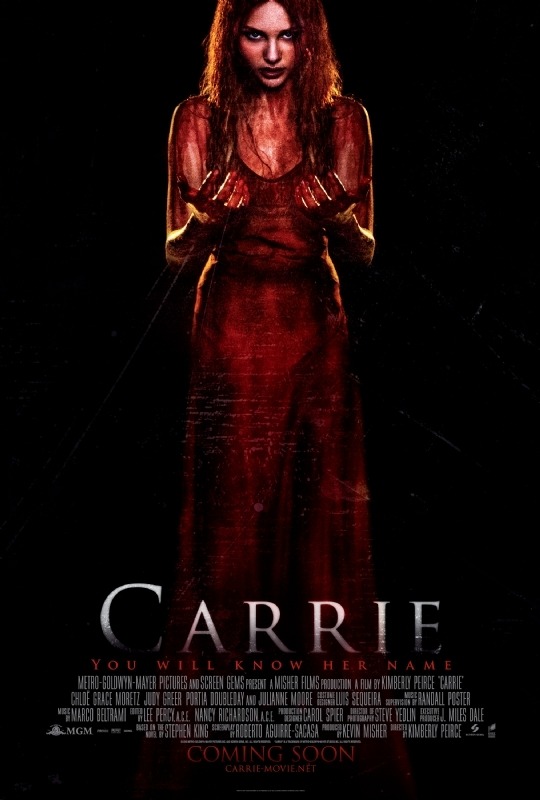
0 notes
Text
The Power of Brand Name Marketing Technique
One of the most successful online marketing experts are the ones that know exactly how to brand themselves.
Simply to clarify what branding is, I will offer you a couple of examples. Winston tastes excellent like a (fill in the space). If you claimed "Cigarette Should," then your right. The firm that developed this motto has actually made numerous dollars from it. Brand name marketing method is effective, due to the fact that it essentially brands the certain suggestion, individual or item right into the minds of the consumer. I do not buy cigarettes, yet I can still recall that brand name slogan regarding cigarettes. Here is one more brand name motto, plop, plop, fizz, fizz, oh what an alleviation it is. This come from the very early 1960's and also people can still remember the business Alka Seltzer that created this type of branding.
Facebook influencer marketing
When done the proper way a brand marketing strategy can create multitudes of leads, leads and individuals who like the brand name, so much, they prepare to purchase. There are several kinds of on-line branding. Some have actually been around for several years, while others are reasonably brand-new and also very effective. There have been numerous success tales of individuals making use of video clip as their brand name marketing technique. Video clip can get to thousands, otherwise millions, of viewers. You tube is a hosting company that enables thousands of video clips to be placed on there site for individuals around the globe to see.
I have actually been working with this branding technique as well as have discovered it to be rather beneficial for my business. The elegance of video is that the leads you get when individuals react are free. So if you have a video and it is gets 1,000 sights and 10 percent click onto your website and or your business opportunity that's 100 leads you usually would have paid for. Video clip if done the proper way can obtain you placed initially in Google searches. Google loves you tube and places them kindly. Another advantage of utilizing video clip as your brand name advertising and marketing technique is you can target very particular groups, companies or hobbies to attract them to you.
TikTok Creator Marketing
Video clip marketing is reasonably cost-effective contrasted to various other kinds of marketing.
I recommend getting a Flip video clip. For the cash this cam provides you great picture and audio quality. It includes an integrated in usb plug, to be able to link into your computer for fast viewing. When you make a mistake, repairing it, is very easy, simply download and install windows movie maker at no charge as well as you are ready to go.
My recommendation would certainly be to, submit 2 or 3 videos a week using this specific sort of brand marketing approach and you will certainly quickly end up being a person that is a leader in your field.
0 notes
Text
On Marinette and Adrien's crisis management strategies
No, I wasn't done talking about Guiltrip. Let's discuss.
So the other day I made this post poking fun at the one scene where Rose sneezes and while the class goes berserk, Marinette orchestrates and organizes the mass hysteria, while Adrien quietly is trying to get everyone to chill.
You know, this scene:
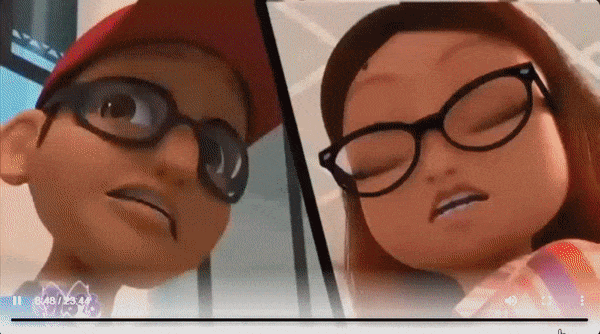
Guiltrip gave us an excellent insight into one of the things that makes the bug and cat, the bug and cat with and without their masks: Their crisis management strategies.
I would argue that one of the biggest lessons of ml is that you can't always control the situations around you, nor convince mean people to stop being mean, but you can control how you react to these negative scenarios. I would argue even further, that it is precisely Marinette and Adrien's ability to manage themselves in these situations what makes them practically impossible to akumatize.
So far, Marinette has been close to being akumatized thrice and in two of those occations she either reasoned with herself or had someone else's help (Mme. Bustier) to avoid becoming overwhelmed. Adrien, on the other hand, has been akumatized once and for what I would consider pretty freakin' understandable reasons. This is to say, in a world where grown men get akumatized over pigeons and the way bread should be made, crisis management is indeed a super power. And it was oh so interesting to see this episode contrasting each style, because for a brief moment, we actually saw them being Ladybug and Chat Noir without the mask.
Why? Well, who is known to manage complex, time-sensitive problems under stress and delivering an equally complex, thoughtful solution? Who, in the direst hour, is able to calmly consider the situation and provide the unwavering support needed to overcome the odds? I'll give you a hint:

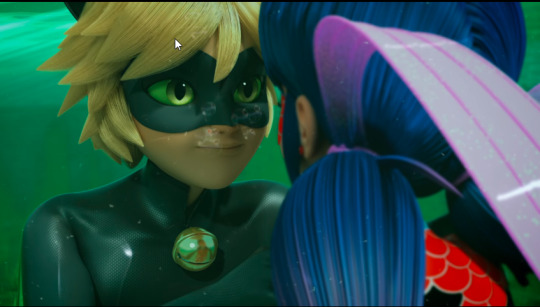
It was also very interesting to see how these crisis handling translates into the ways they each rationalize a negative situation and where they turn to for support. When they attempted to console Juleka, while Adrien tried to approach the problem first looking at it from Juleka's point of view (something we see him doing also with Chloe or even his dad), Marinette rallied the rest of her friends to show their support (something she herself relies on when she is feeling down, as we see when she reaches for Chat Noir or Alya).
You can argue that maybe if Marinette hadn't jumped the gun to tell everyone, Adrien would probably have been able to reason with her, provide her some experience-based words of encouragement, and avert the crisis that emerged when Rose found out Juleka had told the class about her illness. But you can also argue that if Juleka hadn't witnessed how willing her classmates were to support her, she would still feel alone, thus prolonging her suffering. In this sense, both crisis management styles have their pitfalls and advantages by themselves, but when you put them together, they create a well-rounded solution.
So yes, I'm not even sure I made my point, but that's what I wanted to say.
tl;dr: Guiltrip showed us Marinette and Adrien acting like Ladybug and Chat Noir for 0.2034 seconds and they were both completely unaware.
#ml spoilers#ml meta#ml analysis#miraculous ladybug#ml guiltrip#ladybug#chat noir#marinette dupain cheng#adrien agreste
2K notes
·
View notes